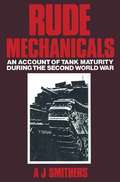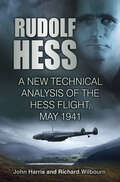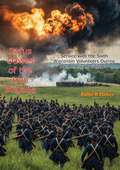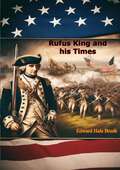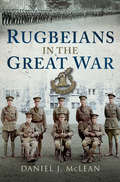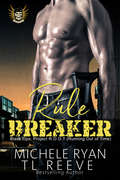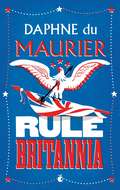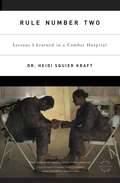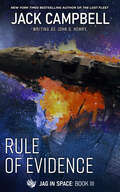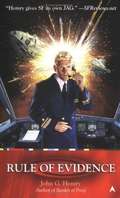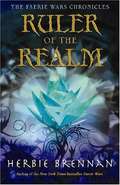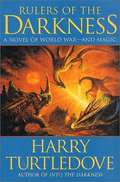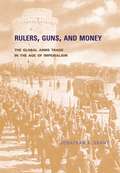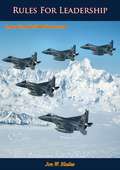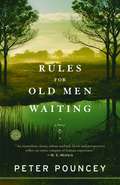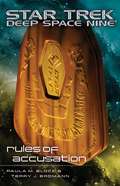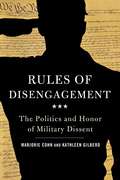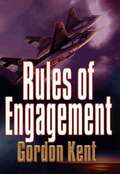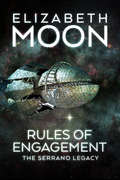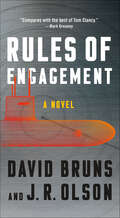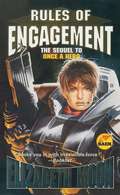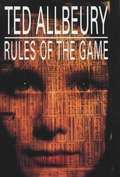- Table View
- List View
Rude Mechanicals: An Account of Tank Maturity during the Second World War
by A. J. SmithersIn this sequel to "An New Excalibur", which examined the development of the tank during World War I and after, Smithers examines the role played by tanks in World War II. At the beginning of the war only the Germans and the Russians had realized the full power of the tank. The British and the Americans were forced to try to catch up. One difficulty was fundamentally a matter of finding the right tool for the right job. In the last year of the war, the Germans relied on the immense King Tigers, which lacked speed and manoeuvrability; while the Allies were confined to Shermans, Cromwells and Churchills, which were incapable of making a heavyweight impact. Each side had some envy for the other.
Rudolf Hess: A New Technical Analysis of the Hess Flight, May 1941
by John Harris Richard WilbournOn 10 May 1941, on a whim, Hitler’s deputy Rudolf Hess flew a Messerschmitt Bf 110 to Scotland in a bizarre effort to make peace with Britain; Göring sent fighters to stop him but he was long gone. Imprisoned and tried at Nuremberg, he would die by his own hand in 1987, aged 93. That’s the accepted explanation. Ever since, conspiracy theories have swirled around the famous mission. How strong were Hess’s connections with the British establishment, including royalty? Was the death of the king’s brother, the Duke of Kent, associated with the Hess overture for peace? In the many books written about Hess, one obvious line of enquiry has been overlooked, until now: an analysis of the flight itself – the flight plan, equipment, data sheets, navigation system.Through their long investigation, authors John Harris and Richard Wilbourn have come to a startling conclusion: whilst the flight itself has been well recorded, the target destination has remained hidden. The implications are far reaching and lend credence to the theory that the British establishment has hidden the truth of the full extent of British/Nazi communications, in part to spare the reputations of senior members of the Royal Family. Using original photography, documentation and diagrams, Rudolf Hess sheds light on one of the most intriguing stories of the Second World War.
Ruff's War
by Cheryl Lynn Ruff K. Sue RoperTwenty-five years in the Navy had made Cheryl Ruff an independent, resilient, strong woman - and a master at providing patient care while serving at various Navy hospitals around the world. But nothing prepared her mind, body, soul, and spirit for what she experienced on the frontlines of the Iraq war as a member of the Bravo Surgical Company. Known as the "devil docs," they followed directly behind the 1st Marine Expeditionary Force as they entered Iraq at the onset of Operation Iraqi Freedom in March 2003. Right along with the Marines, Commander Ruff, the only female nurse anesthetist at the front, and the rest of her surgical team learned to endure the brutal conditions of the desert while regularly confronting questions of life and death. Working in temperatures well over 100 degrees in full MOP gear, Ruff and her team set up mobile hospital tents in the sand wherever needed. As Black Hawk helicopters brought in steady streams of the wounded, they found it impossible to maintain standard sterilization procedures, and clean up often amounted to just shovelling the blood-soaked sand out of the tent. During surgery they often wore lighted helmets so they could continue operating if the generator failed and donned gas masks when warnings were issued. These horrific conditions, coupled with the gruesome images of shredded bodies and the cries of wounded children, became Ruff's world. This is her story of the war, up close and personal. It is a story of sacrifice, survival, and courage, movingly written by a woman unconditionally dedicated to the life-saving mission of the United States Navy Nurse Corps.
Rufus Dawes of the Iron Brigade: [Illustrated Edition]
by Rufus R DawesIncludes Civil War Map and Illustrations Pack - 224 battle plans, campaign maps and detailed analyses of actions spanning the entire period of hostilities.“With the Iron Brigade on campaign and battlefieldFor students of the American Civil War, the name Rufus Dawes will be forever associated with the famous Iron Brigade of the Union Army—that hardy and courageous assembly of regiments from the western states whose steadfastness in the thickest of battlefield conflicts earned them their descriptive nickname. Born in 1838, Dawes was just 23 years old when the Civil War broke out and he became a captain in the 6th Wisconsin Volunteer Infantry, the regiment he would, in time, come to famously command. Dawes was always an ardent and aggressive battlefield commander. He served with the regiment at Groveton, Antietam, Fredericksburg and through the Chancellorsville campaign. At Gettysburg he notably led the counter-attack on Davis's Confederate brigade sheltering in a railway cutting and there took some 200 prisoners. Dawes served at Mine Run, the Wilderness Campaign, the sieges of Petersburg and Spotsylvania and Cold Harbor in 1864. Worn out physically and mentally, Dawes was mustered out after three years of the most intensive combat—he was just 26 years old. The following year he was promoted to brevet brigadier general. This book, Dawes' own account of his regiment of 'Black Hats' of the Iron Brigade, is an acknowledged classic of the period.”-Print ed.
Rufus King and his Times
by Edward Hale Brush“Rufus King and His Times is a biographical work by Edward Hale Brush that offers a comprehensive account of the life and times of Rufus King, one of the most prominent figures in American history. The book traces King's life from his birth in Massachusetts in 1755 to his death in New York in 1827, highlighting his significant contributions to the American Revolution, the Constitutional Convention, and the early years of the United States. The book is divided into several chapters that cover different aspects of King's life, starting with his early years and education, his service in the Continental Army during the Revolutionary War, and his role in the ratification of the US Constitution. The author also explores King's political career, including his time as a US senator and ambassador to Great Britain, as well as his personal life, including his marriage to Mary Alsop and his relationships with other notable figures of his time. Throughout the book, Brush provides a detailed and engaging account of King's life and accomplishments, drawing on a wealth of primary sources and historical documents. He also offers insights into the social, political, and cultural contexts of King's era, providing readers with a rich and nuanced understanding of the times in which he lived. Overall, Rufus King and His Times is a compelling and informative biography that sheds light on a key figure in American history and the tumultuous times in which he lived. It is an essential read for anyone interested in the early years of the United States and the people who helped shape its destiny.”-Print ed.
Rugbeians in the Great War
by Daniel J. McLeanThe courage and sacrifices during World War I of the students who attended the influential boarding school best known for the sport that bears its name.Few schools can claim to have had such a deep and diverse effect on British history as Rugby. Its influence on the sporting field is well-known, but this book examines the roles played by Rugbeians in many different spheres during the Great War. Politicians and academics, Olympians and artists all left their ordinary lives to fight for their country and it was their school which bound them together. Some such as Ernest Swinton, inventor of the tank, and Maurice Hankey, Cabinet Secretary, had direct influence on the shaping of the conflict, whereas others such as Duncan Mackinnon (Olympic gold medal-winning rower) and the Cawley brothers (both Members of Parliament) are remembered primarily for their pre-war achievements. Until now there has never been a volume which traces the extent of Rugby’s influence, but this book showcases the extraordinary range of individuals from the school who left their mark on the war and the world at large.“I would say that the author has gone to great concentration and written an excellent and very detailed book. There is no other thing to do but to recommend this book, a really excellent book.” —The UK Historian
Rule Breaker (Black Ops: Project R. O. O. T Ser. #1)
by Tl Reeve Michele RyanAsher Rainer, a tough as nails commander, leads an undercover black ops group: Project R.O.O.T. sanctioned by the U.S. government. What should have been a routine mission to obtain reconnaissance, devolves into a mass casualty situation. The whys of which are unknown. His only eyewitnesses to the crimes committed by the rogue mercenary unit are Dr. Rae Kenzie and one of Barclay’s own members, Joseph Franks.Rae Kenzie, a physician with Doctors Without Borders, is currently on rotation in South American. What should have been a routine inspection by the local guerilla army, turns into a bloodbath. Without any thought to her wellbeing, Rae rushes to protect the village children in the clinic from certain death—unwittingly thrusting herself and them into the middle an ongoing power struggle. Rae has to trust someone with what she knows, but it doesn’t mean she has to like them—even if she finds Commander Asher Raines devilishly handsome. Asher has no time for love. His dedication is to his team, his country, and protecting the innocent. But, when the heart desires what he shouldn’t be lusting after, will one night with Rae be enough to satisfy his baser needs? Or will he be the one to break all the rules?
Rule Britannia (Virago Modern Classics #120)
by Daphne Du MaurierFROM THE BESTSELLING AUTHOR OF REBECCAIn this prescient novel, Daphne du Maurier explores the implications of leaving Europe for a political, economic and military alliance with the United States.'It is rather awful, Emma thought as she walked across the fields down to the farm, how this business is leading us all into subterfuge and deception, and we can't really tell who is friend and who is enemy . . . 'Emma wakes up one morning to an apocalyptic world. The cosy existence she shares with her grandmother, a famous retired actress, has been shattered: there's no telephone, no radio - and an American warship sits in the harbour. England has withdrawn from the European Common Market and, on the brink of bankruptcy, has decided that salvation lies in a union - political, military and economic - with the United States. Theoretically it is to be an equal partnership, but it soon begins to look like a takeover bid.As the two women piece together clues about the 'friendly' military occupation on their doorstep, family, friends and neighbours come together to resist the interlopers.The spirit of Britannia embodied - SUNDAY TELEGRAPH
Rule Britannia (Vmc Ser. #528)
by Daphne Du MaurierFROM THE BESTSELLING AUTHOR OF REBECCAIn this prescient novel, Daphne du Maurier explores the implications of leaving Europe for a political, economic and military alliance with the United States.'It is rather awful, Emma thought as she walked across the fields down to the farm, how this business is leading us all into subterfuge and deception, and we can't really tell who is friend and who is enemy . . . 'Emma wakes up one morning to an apocalyptic world. The cosy existence she shares with her grandmother, a famous retired actress, has been shattered: there's no telephone, no radio - and an American warship sits in the harbour. England has withdrawn from the European Common Market and, on the brink of bankruptcy, has decided that salvation lies in a union - political, military and economic - with the United States. Theoretically it is to be an equal partnership, but it soon begins to look like a takeover bid.As the two women piece together clues about the 'friendly' military occupation on their doorstep, family, friends and neighbours come together to resist the interlopers.The spirit of Britannia embodied - SUNDAY TELEGRAPH
Rule Number Two: Lessons I Learned in a Combat Hospital
by Heidi Squier KraftWhen Lieutenant Commander Heidi Kraft's twin son and daughter were fifteen months old, she was deployed to Iraq. A clinical psychologist in the US Navy, Kraft's job was to uncover the wounds of war that a surgeon would never see. She put away thoughts of her children back home, acclimated to the sound of incoming rockets, and learned how to listen to the most traumatic stories a war zone has to offer.One of the toughest lessons of her deployment was perfectly articulated by the TV show M*A*S*H: "There are two rules of war. Rule number one is that young men die. Rule number two is that doctors can't change rule number one." Some Marines, Kraft realized, and even some of their doctors, would be damaged by war in ways she could not repair. And sometimes, people were repaired in ways she never expected. RULE NUMBER TWO is a powerful firsthand account of providing comfort admidst the chaos of war, and of what it takes to endure.
Rule of Evidence (JAG in Space #3)
by Jack CampbellNew York Times bestselling author Jack Campbell continues his thrilling courtroom drama series exploring law, ethics, and justice in the U.S. Navy’s spacegoing fleet…With international relations tense, Lieutenant Junior Grade Paul Sinclair knows why his ship is ordered into joint maneuvers: to show off the might of the United States Navy’s Space Force. But executing precise movements of enormous battle cruisers, in close quarters, at unthinkable speeds, is nerve-wracking work even when all goes according to plan. Then a sudden massive failure leaves innocent people dead.When Paul’s beloved, Lt. Jen Shen, is accused of intentionally causing the incident, Paul is soon back in the court martial courtroom with more on the line than he’d ever imagined. Jen can’t prove a negative. The JAG lawyer Paul most respects is prosecuting the case. And when everyone, even Jen, doubts there’s a way out, Paul will have to somehow find and expose the truth on his own…
Rule of Evidence (JAG in Space, Book #3)
by John G. HemryThe USS Michaelson is conducting maneuvers alongside her sister ship, the USS Maury in a show of military strength. The Michaelsons legal officer, The operation is going by the numbers--until the Maury is wracked by devastating explosions and its engineering section is destroyed. Paul is overjoyed when Jen is found alive, but his happiness is short lived. Jen, as the sole survivor in Engineering, is suspected of negligence--or worse, sabotage--and faces court-martial. Now Paul must find out what really caused the explosions. But the more he learns, the more he faces the terrible possibility that the woman he loves may be guilty of sabotage and murder...
Ruler of the Realm (The Faerie Wars Chronicles #3)
by Herbie BrennanIt is Henry's third visit to the Faerie Realm, but this time in a rather different guise and to a rather different kind of place. Holly Blue is Queen and Lord Hair streak appears to be proposing a truce between the Faeries of the Night and the Faeries of the Light. Meanwhile Prince Pyrgus has stumbled across some mysterious crystal flowers with an apparently formidable secret weapon, and there are rumours of a demon invasion led by Beleth, the Prince of Darkness. Queen Blue, wary of her uncle's uncharacteristic generosity, pays a visit to the Spicemaster's labyrinth in an attempt to divine the possible future of the Realm. She is warned to beware someone close, little realizing just how careful she will need to be - and when she is kidnapped by the most unlikely candidate, the Realm rapidly descends into chaos. In a thrilling adventure Blue, Pyrgus and Henry will find themselves in the midst of a furious battle to protect the future of the Realm and secure the throne for the rightful ruler.
Rulers of The Darkness (The World At War, Book #4)
by Harry TurtledoveThe fourth in the world at war series where guns are powerful magical sticks and the old biplanes of 1940 aare dragons.
Rulers, Guns, and Money: The Global Arms Trade in the Age of Imperialism
by Jonathan A. GrantThe explosion of the industrial revolution and the rise of imperialism in the second half of the nineteenth century served to dramatically increase the supply and demand for weapons on a global scale. No longer could arms manufacturers in industrialized nations subsist by supplying their own states' arsenals, causing them to seek markets beyond their own borders.Challenging the traditional view of arms dealers as agents of their own countries, Jonathan Grant asserts that these firms pursued their own economic interests while convincing their homeland governments that weapons sales delivered national prestige and could influence foreign countries. Industrial and banking interests often worked counter to diplomatic interests as arms sales could potentially provide nonindustrial states with the means to resist imperialism or pursue their own imperial ambitions. It was not mere coincidence that the only African country not conquered by Europeans, Ethiopia, purchased weapons from Italy prior to an attempted Italian invasion.From the rise of Remington and Winchester during the American Civil War, to the German firm Krupp's negotiations with the Russian government, to an intense military modernization contest between Chile and Argentina, Grant vividly chronicles how an arms trade led to an all-out arms race, and ultimately to war.
Rules For Leadership: Improving Unit Performance
by Jon W. BladesThis book presents an original set of leadership “rules” or principles that can be used to improve unit performance in any specific group situation and at all organizational levels. The 10 “rules” describe the influence which leadership style, leader enforcement of performance standards, group member intelligence, group member ability, leader intelligence, leader ability, group member motivation, leader motivation, and group cohesion have on unit performance.Basically, the evidence establishes very clearly that (1) the nondirective and directive leadership styles are each very effective ways to improve unit performance in certain situations but are poor choices to use in others; (2) high levels of enforcement of performance standards, intelligence, ability, motivation, and cohesion will increase unit performance in some situations but will not influence the outcome in others; and (3) low levels of these factors will decrease unit performance in certain situations but will not affect the outcome in others. In other words, the effect each of these factors has on performance is not constant but, rather, varies from one situation to the next. The key premise is that the amount of influence each of these factors has on performance depends upon the presence or absence of certain other factors in the group situation. For each rule in this book, statistical evidence in the form of data collected from 49 US Army units is presented in support. The summary chapter integrates the separate rules and presents recommended courses of action for the leader to take in order to use the rules properly in whatever particular group situation is encountered.In a secondary role, additional material is presented which describes actions that leaders can take to raise the level of several important group qualities such as motivation, ability, and cohesion.
Rules for Old Men Waiting: A Novel
by Peter PounceyA brief, lyrical novel with a powerful emotional charge, Rules for Old Men Waiting is about three wars of the twentieth century and an ever-deepening marriage. In a house on the Cape “older than the Republic,” Robert MacIver, a historian who long ago played rugby for Scotland, creates a list of rules by which to live out his last days. The most important rule, to “tell a story to its end,” spurs the old Scot on to invent a strange and gripping tale of men in the trenches of the First World War. Drawn from a depth of knowledge and imagination, MacIver conjures the implacable, clear-sighted artist Private Callum; the private’s nemesis Sergeant Braddis, with his pincerlike nails; Lieutenant Simon Dodds, who takes on Braddis; and Private Charlie Alston, who is ensnared in this story of inhumanity and betrayal but brings it to a close.This invented tale of the Great War prompts MacIver’s own memories of his role in World War II and of Vietnam, where his son, David served. Both the stories and the memories alike are lit by the vivid presence of Margaret, his wife. As Hearts and Minds director Peter Davis writes, “Pouncey has wrought an almost inconceivable amount of beauty from pain, loss, and war, and I think he has been able to do this because every page is imbued with the love story at the heart of his astonishing novel.”From the Hardcover edition.
Rules of Accusation (Star Trek)
by Terry J. Erdmann Paula M. BlockAn original eNovella set in the Star Trek: Deep Space Nine universe!On the space station Deep Space 9, Quark's Public House, Café, Gaming Emporium, Holosuite Arcade, and Ferengi Embassy can't legitimately be called an embassy until the Grand Nagus--namely, Quark's brother Rom--dedicates it as such. Not that Quark really cares about Ferengi protocol, but a well-publicized dedication ceremony will naturally draw people to the bar. Everybody loves a good open house--free appetizers, half-price drinks, door prizes, etc.--all of which Quark can write off as Embassy expenses. It's a win-win situation, with him on both sides of the win. There's even a plan to display the original scroll of the Ferengi Rules of Acquisition--which no one has seen for decades given that it's been held in protective storage--and charge patrons by the minute to look at it up close. Nothing, of course, could possibly go wrong with this big plan. Absolutely nothing at all...
Rules of Disengagement (Goldstein-Goren American Jewish History)
by Marjorie Cohn Kathleen GilberdLessons from veterans and active duty service members in opposition to US interventionist military policyRules of Disengagement examines the reasons men and women in the military have disobeyed orders and resisted the wars in Iraq and Afghanistan. It takes readers into the courtroom where sailors, soldiers, and Marines have argued that these wars are illegal under international law and unconstitutional under US law. Through the voices of active duty service members and veterans, it explores the growing conviction among our troops that the wars are wrong. While the Obama Administration’s pledge to remove all American troops from Iraq by the end of 2011 is encouraging – and in no small way likely attributable to resistance by our armed forces – it continues to fight in Afghanistan, and the military may soon have a heightened presence elsewhere in the Middle East and in Africa. As such, Rules of Disengagement provides inspiration and lessons for anyone who opposes an interventionist US military policy.
Rules of Engagement (Alan Craik Series #1)
by Gordon Kent"Flying, spying, dying--Rules of Engagement is the real straight Navy stuff. Better strap yourself to the chair for this one. I loved it." --Stephen Coonts, author of Fortunes of War. Rules of Engagement marks the spectacular debut of Gordon Kent, the pseudonym of a father-and-son writing team, both of whom have served in the U. S. Navy. They have crafted a tale with striking authenticity and remarkable psychological depth sure to appeal to the fans of Tom Clancy, Stephen Coonts, and Dale Brown. Shortly before the Gulf War, Alan Craik, a young U. S. Navy Intelligence officer, is posted to one of two aircraft carriers headed toward the Persian Gulf. On board the other is his father. When both take part in a nighttime strike on the Iranian coast, Lt. Craik's father's A-6 is hit and plunges into the sea. Shocked by the loss of this commanding figure in his life, Craik refuses to accept the official explanation that a lucky strike from an Iranian missile has downed the plane. After further investigation his instincts tell him the real story is much more disturbing: someone on his father's ship sabotaged his plane and he's still on board. The hunt becomes increasingly urgent when Craik discovers that the Navy may be harboring not just one traitor, but two: a father-and-son team who have been betraying their country for years. As Craik gets closer and closer to uncovering them, they will risk everything to keep their secrets.
Rules of Engagement (Brad Austin Series #1)
by Joe WeberMarine fighter pilot Brad Austin was caught in a war that divided America. Snagged in government red tape that inhibited the military. And trapped in a one-on-one air battle with the Vietnamese ace who had terrorized the skies for years.... Then Austin decided to break the rules. One of the most exciting and provocative war novels of our time, Rules of Engagement enters the hearts and minds of America's fighting men--and the difficult choices they were forced to make. Joe Weber, author of the bestselling DEFCON One, is a former Marine Corps pilot whose experience in Vietnam lends startling authenticity to this electrifying tale of courage and dishonor.
Rules of Engagement (Serrano Legacy #5)
by Elizabeth MoonThe New York Times bestselling and Hugo Award-winning author of Once a Hero continues her epic saga of war, power, and loyalty in the cold reaches of space…After proving herself in battle, Esmay Suiza is continuing her RSS Fleet training alongside her erstwhile love Barin when she meets Brun—the ebullient daughter of Lord Thornbuckle—who idolizes her as a reluctant hero. But Esmay cannot abide Brun’s highborn airs. And when their shared affection for Barin ignites a rivalry between them, Esmay is exiled to remote duty. Crushed by the rebuke of her friendship, Brun leaves the facility—and enters a nightmare.For the enemies of civilization are on the move. The savage New Texas Militia, driven to spread their fanatical dogma, has been stealing the Familias government’s own weaponry to use against them. When Brun accidentally witnesses their depredations, her life is all but forfeit. Taken by the Militia, she is subjected to inhuman torment as Esmay is blamed for the disastrous situation and the galaxy prepares for inevitable conflict.With the life of Brun and the dominance of the Familias Regnant both in peril, Esmay must go into action once again against a brutal, deranged enemy who would rather die than face defeat…
Rules of Engagement: A Novel (The WMD Files #1)
by David Bruns J. R. Olson"In Rules of Engagement, David Bruns and J. R. Olson deliver a captivating and utterly authentic portrayal of modern day combat that compares with the best of the timeless classics by Tom Clancy, Dale Brown, and Stephen Coonts. This one must not be missed!" —Mark Greaney, #1 New York Times bestselling author of Mission CriticalA terrorist breach of the computer systems of the three most powerful navies is about to set them on a collision course for World War III.Rafiq Roshed is one of the most wanted men in the world. A terrorist with a virulent grudge against the West, he’s disappeared into North Korea where he quietly launches cyber sneak attacks in service of Kim Jong-un. But now he’s about to unleash his virtual masterpiece—a computer virus that, once inserted into the command systems of a military, not only takes over, but also learns the art of war. First penetrating the Chinese, he has their war machine launch a series of attacks on the U.S. Pacific forces.Don Riley, head of U.S. Cyber Command, discovers that not only have the Chinese lost control of their military, but the same virus has infected the American network. It’s only a matter of time before the U.S. loses control of its own military. His secret weapon in this war is a trio of supremely talented midshipmen from the U.S. Naval Academy, who uncover the infiltration, and are working to track down the elusive terrorist.But time is running out. China and Japan have lost control of their military and the U.S. is in danger of doing the same. The weapons are hot and the result is an ever-larger real-world conflict where casualties continue to mount. The only remaining hope is to find and stop the attack at its source—before time runs out.
Rules of Engagement: Familias Regnant V (Familias Regnant #5)
by Elizabeth MoonOne Hero Too Many... Esmay Suiza and Brun Meager should be friends--they're both bright, brave, likable and adventurous. But true friendship doesn't run any smoother than true love. Brun thinks Esmay's a stuck-up prig, and Esmay thinks Brun's a spoiled rich brat who's making a play for Barin Serrano, Esmay's first love. So when Brun falls into the hands of a repressive religious militia movement, Esmay finds herself in disgrace, suspected of conniving at the capture. Even Barin, now being pursued by the beautiful and ambitious Casea Ferradi, has turned against her, and Brun's powerful family doesn't want Esmay anywhere near the rescue attempt. Meanwhile, Brun has to figure out how to survive as a pregnant, barefoot prisoner on a planet where female captives are surgically muted to keep them from contaminating others. Her luck may have run out, but her courage hasn't--she's determined to free not only herself, but other, younger captives. This burst of initiative imperils her own rescue, and it will take double her own luck to save her.
